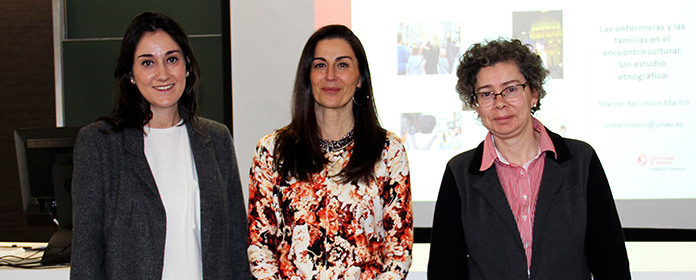Migration and health: from perceptions to health care.
A roundtable organized by the ICS, Nursing, and Philosophy and Letters analyzed the challenges of the migratory phenomenon for the health systems of host countries

PHOTO: Isabel Solana
The Institute for Culture and Society (ICS), the School de Enfermería and the School de Philosophy y Letras organized the roundtable 'Migraciones y salud. From perceptions to health care'. The participants were Maider Belintxon, from area of research 'Health Promotion', and Carolina Montoro, from department of History, Art History and Geography. It was moderated by Ana Marta González, scientific coordinator of the ICS.
Maider Belintxon presented part of the findings of her doctoral thesis on nurses and families in the cultural meeting , in which she collected data from six nursing offices in two health centers in Navarra.
She focused on analyzing primary care, which is the first contact with the health system. The expert proposes the following: train to health professionals, adapting resources and programs to the diversity staff; offering person-centered care; and betting on a health system as model integrator, which promotes health care at all levels.
Carolina Montoro presented a research on the social determinants of health among Moroccan immigrants in Spain. This is a gender-based case study within the framework of the Moroccan Migration Project, to which Princeton University and the Red Cross also belong. The research was based on the self-assessment of health and its evolution from the time of migration.
The study revealed that for women, the main protective factor for health is autonomy at work: having their own income and a certain Degree of independence. With respect to men, the first significant variable is housing: the older the house - and therefore the cheaper it is - the better health they have because it is less of a burden.
